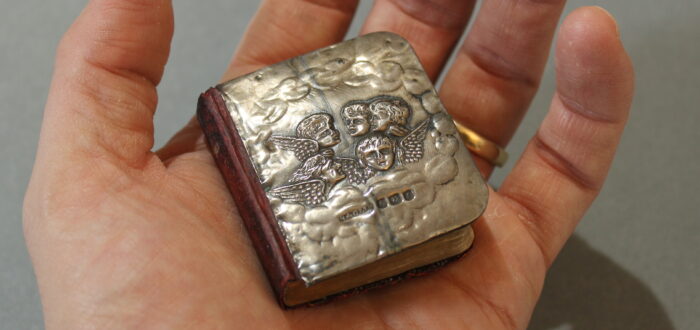We’ve published our latest Conservation Newsletter No. 7, Autumn 2021.
- arthur@greensbooks.co.uk
- 01684 310106
Green's Books
Having recently completed a Master’s degree in Book Conservation at West Dean College, I was incredibly pleased to be offered work at Green’s Books straight away. Originally from Austria, I studied History and Philosophy at University College, Dublin before moving to the UK. During my training, I undertook placements at The National Archives, the Staatsbibliothek
We’ve published our latest Conservation Newsletter – No. 6, Summer 2021.
We’ve just published our latest Conservation Newsletter – No. 5, Spring 2021
We’ve just published our latest Conservation Newsletter. Newsletter No. 4, Winter 2020-21
My latest read is Lionel Darley’s Bookbinding Then and Now: A Survey of the First Hundred and Seventy-Eight Years of James Burn & Company (London: Faber & Faber, 1959). As its title suggests, the book is a history of an English bookbinder, James Frederick Burn (1828-1870), and the London company first established in 1781 by
I’ve been working on springback bindings for many years and thought I’d share my selected bibliography on the subject. It’s not exhaustive but hopefully covers all the significant works. If you have any suggestions to add, do let me know! Click here for our springback bibliography.
Let me present my latest find: M. Dupont, Ou La Jeune Fille Et Sa Bonne by Charles Paul De Kock (Paris, 1835). The book is an octavo, printed on paper; with tipped endleaves formed from single folds of white paper; multi-section sewn on three recessed cords; rounded and backed; with cut edges and without endbands. Importantly, it
The latest issue of our Conservation Newsletter No. 3, Autumn 2020 is out now.
We’re now pleased to be welcoming our students back for one-to-one teaching and workshops. To help make it as safe and pleasant as possible, we’ve developed some Covid-19 guidance for students. We welcome your feedback and will keep reviewing the situation.
Categories
Archives
- November 2024
- February 2024
- December 2023
- August 2023
- February 2023
- September 2022
- May 2022
- April 2022
- March 2022
- December 2021
- October 2021
- June 2021
- February 2021
- January 2021
- November 2020
- September 2020
- August 2020
- July 2020
- June 2020
- April 2020
- February 2020
- January 2020
- December 2019
- November 2019
- July 2019
- February 2019
- January 2019
- November 2018
- October 2018
- August 2018
- June 2018
- May 2018
- September 2017
- August 2017
- May 2017
- March 2017
- February 2017
- October 2016
- September 2016
- July 2016
- June 2016


